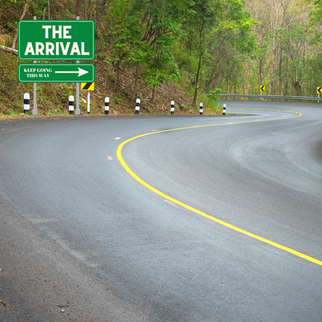Ideas for navigating life as a flawed human, by a flawed human.
- Hannah Whittaker Komatsu
- Feb 4, 2024
- 11 min read
Lived experience insights on finding beauty in flaws.
I began writing this on the eve of 2024 as I waited for an outpouring of social media reflections about 2023. My reflections were plentiful, but I have learned that my thoughts on New Year’s Eve are not always sound. I was, however, sure that 2023 had been a big year for me, partly because it was yet another one where I discovered more of my flaws and struggled, despite my attempts, to shake off the ones I had already found. Beautifully, however, 2023 once again taught me that my flaws serve a purpose.
It seems no coincidence that I experienced the pull towards using AI to help write this blog while struggling with self-acceptance, even of those I had previously embraced. I had also been struggling with a desire to improve my writing so it was more acceptable in my work environment.
There was a solid pull to accept the invitation to use AI with its promise to produce more polished, readable, grammatically correct work. My inner dialogue on catching this thinking rolled out something like, “What the actual f@ck, Hannah? You believe in being you, in the moment you are, recognising that you are on a journey to being all who you can be into the future.”
My decision to push past the discomfort of thinking my writing isn’t good enough, that despite my flaws, I would take a risk and create an avenue for me to articulate my thinking, led me to name my blog, ‘I am not a robot. Writing by a human. A flawed human.’
However, as I worked on building the website, I began to feel uncomfortable with the bold declaration: A flawed human. “Don’t put yourself down like that, Hannah!” was constantly playing, closely followed by “Aren’t you healed yet??”.
Navigating life as a flawed human has involved developing hard-earned wisdom relating to owning, accepting and celebrating my flaws. So, despite the insistence of my internal narratives, the tagline has remained, and I decided that the best counter to the chatter was to use my first post to explain my thoughts on being a truly flawed human.
All blog advice suggests looking at what others have said on the topic. I did a bit of a Google and discovered that wise people writing about flaws often focus on acceptance. For me, however, some critical reflections were missing. I have done my best to explain these, spreading them across two blog posts because, unsurprisingly, to many who know me, one of my flaws is being very wordy!
Yes, being flawed is to be human.
As other writers have stated, being flawed is to be human. Accepting ourselves wholeheartedly, including our flaws, is a challenge. And I can get why. The social narrative that we soak up like a thirsty sponge isn’t that to be flawed is to be human. It is to be flawed is to fail.
Beautiful quotes like Marilyn Monroe’s “Imperfection is beauty, madness is genius, and it's better to be absolutely ridiculous than absolutely boring” are not the socially dominant story. Instead, for the most part, we absorb the often unspoken story that perfection is to be strived for, madness is an illness, and being ridiculous might occasionally be better than boring, but only in confined spaces, like costume parties. On the whole, we talk about being flawed as a bad thing. And honestly, being flawed IS problematic.
The Collins dictionary states that “a flaw in something such as a theory or argument is a mistake in it, which causes it to be less effective or valid.” Concerning character, “A flaw in someone's character is an undesirable quality that they have”, with synonyms including "failing, defect, and weak spot". Everything that we hear about the existence of flaws is that they are bad, creating a pretty clear-cut message from the world - having a flaw is to have a deficit.
Another black-and-white rule around flaws can be that any single flaw means we, in our entirety, are flawed. When we discover one flaw about ourselves, suddenly, everything great about us disappears. We're flawed, or we are not. That seems like throwing the baby out with the bathwater. On those rare occasions where we find a bit of kindness towards ourselves, we may still acknowledge good in ourselves but weigh the flaw/s far heavier than the celebrated components of who we are.
But not all the messaging about flaws is so black and white. At the same time, as we are soaking up messages that they are terrible, we are getting others about self-acceptance, including suggesting that an inability to accept oneself is also a flaw. No wonder we end up confused.
My recent struggles this year have highlighted that navigating and accepting being a flawed human continues to challenge me. Along my journey, however, I have come to see that not all flaws are negative. While they are a challenge, they may, in fact, be part of what is required to get through a moment or to have the strength that our communities need. At times, our flaws are the very foundation of our potential.
Let’s first clear up the social narrative sea we swim within.

Before I talk about the potential usefulness of flaws, which may be the key to unlocking acceptance of them, I want to blow some sh#t right out of the sea of social narrative we bathe within. Let's be honest; no one's f@cking perfect. No one popped straight out of the womb destined to get it all right, all sorted, no worries, just perfect. A flaw-free zone.
And even when there are people who do appear perfect, this is precisely that … appearance. And, a lot of energy often goes into that appearance, more energy than I am prepared to spend any longer. It takes enough just trying to navigate the world having flaws, let alone trying to appear not to have them.
So, the reality is that there is no one without flaws. I don't care who you are, how saintly you might be, how flipping amazing you are, or how much awesome stuff you do. You've still got flaws. There’ll be things that you do that are unhelpful to yourself or others. We, as beings, are flawed. Perhaps, instead of passing judgement on one another, we could bond over this reality a little more often.
So should we just accept our flaws and be assholes?

Ah. No. No, we don't embrace that either.
Self-acceptance isn’t a call to inaction if the current state of living negatively impacts oneself or those around you. Self-acceptance based on radical acceptance and self-compassion acknowledges that we can simultaneously work on improvements while accepting ourselves.
And, it is possible to work on your flaws without putting yourself down. Without beating yourself up and living life filled with feelings that are created by an internal dialogue of “I’m so flawed, I'm a bad person, I am a failure”.
In moving from an expectation of being flawless to ‘flawed-less’ (see what I did there), some of the elements essential for me to remember are:
Locate flaws in context and understand their history and purpose.
Consider the relational and situational nature of any given flaw.
Having a relationship with myself means having one with my flaws.
I will speak to this list's first few points for the remainder of this post. Then, if that piques your interest, check out part two!
Accepting we are on a journey, a never-ending journey.
For me, being flawed means accepting I'm on a journey, a wild road trip that has no map and no final destination. The journey itself is the purpose.
So often, across my life, there have been many named journeys. Recovery journey, healing journey, rehab journey, so many damn journeys, no wonder I am so tired. For crying out loud, I even took the self-forgiveness side trip that springs off the self-acceptance journey. And all of them had an unspoken or undefined destination: THE ARRIVAL.
I am sure you have your own. The belief we will one day finally arrive at ‘the thing’. Be it recovered, healed, or whatever the desired destination. And we measure ourselves against the progress made towards these destinations. I can almost hear my internal chatter singing, like a chorus in the back of the car on the longer distance road trip: “Have we got there yet?” or “How much further?”.
Sadly, I am sorry, THE ARRIVAL is a myth. It's a big fat lie.
Instead, we have ARRIVALS - the many multicoloured arrivals across THE GREAT UNFOLDING—our life story.
Letting go of the myth of THE ARRIVAL requires a different kind of hoping (yes, my dear friend Pāyal has taught me that hope is an action, a doing). We shift from a hope focused on an escape from all that is painful or hurtful to us (or about us) and instead step into an understanding of possibility.
Possibility is a hoping embedded in an acceptance of the interconnected nature of joy and pain, rest and work. When we hold for possibility, we learn to hold tightly to the beautiful moments and acknowledge the need for acceptance in processing painful ones.
I believe what could be called our ‘flawedless journey’ is one where we work towards reducing the negative impacts of how we do life. To do so with self-compassion and radical acceptance involves accepting that we will do things differently, sometimes, and other times not. We can learn to relish the times we do and accept the discomfort when we don't. And if in our flawedness we hurt another, we will work to put it right, to heal the relationship.
The flawedless journey requires a commitment to learning, each lesson supporting us as we journey to the next ARRIVAL. We find lived experience wisdom along the way that can become gifts we can pass on to those who may one day follow similar paths. Because of this, being on a flawedless journey also transforms our flaws into a tool for developing the wisdom to navigate the world around us with our unique flavour.
On the journey, we may also begin to see our flaws a little differently. Accepting a flaw and deciding that we may not eliminate it is, oddly, at times, the first step towards liberation from it. Just as we see an interconnection between joy, pain and other elements of life, we can also see the connection between our strengths and flaws.
Flaws as facilitators of strength
It can be a big reach for some of us to get our heads around, but sometimes, the things identified as flaws are core components of what facilitates beauty in our character. This challenges the dominant story that we must be on a journey to become flawless. If we succeed in removing all flaws, we may lose some of the elements vital for other awesome bits of our character.

I have a light-hearted, semi-humorous example that I journeyed with last year in my work life.
A core part of my lived experience journey has been shifting away from the culture I lived within before actively stepping into healing. Developing a work identity has been even more challenging, with the past two years compounding this as I enter what is, at times, a far more structured environment.
So, anyone who knows me would say I can be a bit sweary. Pretty much any shift in feeling other than flat can initiate my default setting of ‘colourful’. So, when I'm anxious, nervous, happy, angry, passionate, pretty much all of the feelings, the default descriptor language that comes out of my mouth is the F-bomb.
You are lucky because you're reading my words instead of sitting with me in person, which enables me to edit out most of the swearing. While there is still some, initially, there was a lot more. In all honesty, I am also doing this editing in real-time conversations. It is not uncommon for me to develop a stutter as I work through how to adapt my internal narrative suggestions. Let alone the metaphors. While this was more intense historically, it is still challenging today. And sometimes I don’t get it right. I still swear. And I can’t understand those who don’t. Like how do they do it?
But, in reality, who determines that the swearing is a flaw? Along my life journey, there have been places and spaces where swearing was just language and not a flaw; it’s just how we spoke and was part of the culture. And so, I have come to understand swearing is part of my cultural identity. It is a part of who I am. Alongside black clothing, band teeshirts, and unneeded strain on one's neck that we call the performance art of headbanging. And if sh#t's bad, sh#t's bad, and you can say as much. And sometimes, it isn't just bad; it is straight f#cked up.
Interestingly, swearing has sometimes served a purpose in my work life. So I didn’t let it go. I remember going to meetings with social workers and talking like I was still sitting in the gutter on the side of the street, rolling a ciggie with one of the young people I was working with. The professionals' faces were so confused as I spoke the language of the street community in ‘their’ meeting. But that language was a component of what enabled me to engage with and build relationships with the very young people they could not.
Strategic use of swearing and teaching young people when was the best time to use it was a core strategy for supporting them in navigating the two worlds they were living in. The one they grew up in, and the one that needed them to behave in a particular way to be accepted.
But in my current work life, dropping F-bombs isn't appropriate in the vast majority of meetings. The environment is such that people are measured and thoughtful, using a particular language frame. Some colleagues interpret people's big feelings as out-of-place passion, which can be unhelpful when working to influence in an environment where being measured and thoughtful is valued. Swearing can be interpreted as an indication of this passion or possibly anger. As it is not part of the commonplace language, it could even be seen as abuse, and I am sure some (if not many) consider it unprofessional.
And so this is an example of how what might be deemed as a flaw in one space may be a foundation for awesomeness in another. In one space, my flaw of foul language was partly something that enabled a strength: supporting connection and relationship with people for whom society marginalises. It provided evidence of my social class and cultural background, fluency in a language that conveys my insider status. Additionally, my experience of needing to learn to swear less when moving into mainstream society provided lived wisdom that was also useful for sharing with others. In another, this fluency is a potential barrier.
I have many other examples of this: chaos facilitating creativity and an action orientation that comes with unforeseen consequences that need balancing. I could go on and on. A positive consequence can be found for almost every challenging aspect of 'me', especially when I find the balance.

And this finding balance, has been the reality of navigating working in my current role. I have needed to negotiate how to be in this new culture without swearing and without losing my sense of self.
My current workspace has shifted some of my language, which has the potential to impact how I connect to people. Essentially, as I become less flawed in one space, I become more flawed in another. However, relationships matter to me, and we all have a need to belong. As I have a role of amplification, if relationships are harmed, then I can amplify all I want, but no one will be listening. And so, I have seen a new phase in my flawless journey. I desire to find a way to belong, not offend people, but not lose myself. Finding a balance this year has been a learning that has brought with it the understanding that it is essential to question what makes a flaw a flaw.
So, that will be the topic of my next post: how do we step into critical reflection on flaws, locate them in context, identify their purpose, and evaluate the costs of maintenance or elimination? We will then weave into exploring the relational and contextual nature of flaws. Undertaking this can bring us into a new relationship with our flaws, which can shift our relationship with ourselves. So, if you made it through this long-winded and likely flawed rant, you may be interested in checking out the next. This flawed human hopes to see you there… x
PS - I feel a bit odd saying it, but if you really want to make sure you read the next post, you could subscribe below. I can then send a wee email message to let you know it is live :)
References
Collins Dictionary. (n.d). Flaw. In Collins.com Dictionary https://www.collinsdictionary.com/dictionary/english/flaw#:~:text=(fl%C9%94%CB%90%20),be%20less%20effective%20or%20valid.
next reference
Resources on acceptance and self-compassion
Tara Brach on radical acceptance https://www.tarabrach.com/books/radical-acceptance/
Dr. Kristen Neff on self-compassion - https://self-compassion.org/
.png)





















Comments